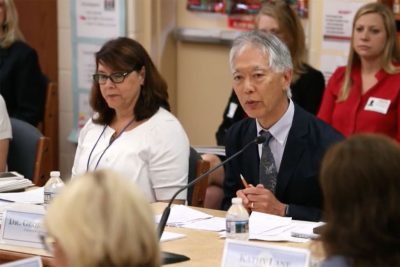
This morning, Neag School Professor George Sugai, an expert in positive behavioral interventions and supports (PBIS), was invited to speak about PBIS and improving school climate with representatives from the U.S. Department of Education’s Federal Commission on School Safety, who made a field visit to an elementary school in Maryland’s Anne Arundel County to learn more about the impact of implementing PBIS practices.
Sugai, as well as administrators, teachers, and students from the Anne Arundel County public school district, each shared with Commission representatives insight into PBIS during a panel discussion.
Sugai shared some background information about PBIS as well as the national Center of Positive Behavioral Interventions and Supports, for which he serves as co-director. Currently, there are 26,000 schools nationwide that call themselves PBIS schools and that are working toward improving school climate, relationship building, and connectedness, Sugai said.
“One thing we’re learning is that schools that have a positive school climate are able to respond more quickly and more strategically to traumatic events.”
— Professor George Sugai
“One of the outcomes [of PBIS] is that the school builds a continuum of support. What that means is that all kids get what they need, but some kids need a little extra. And a few kids need something that is more individualized,” he said. “If you do PBIS well, these are the outcomes: You’re likely to see decreases in discipline referrals for major infractions; you’re likely to see decreases in bullying; you’re likely to see increases in organizational health and school climate. … The [PBIS] framework allows those outcomes to become real. The framework is really about helping the adults get to those kinds of outcomes.”
He then fielded questions from Secretary of Education Betsy DeVos, as well as other representatives from the Commission. Questions touched on the flexibility of PBIS implementation and the prevalence of PBIS in schools across the country.
“One thing we’re learning is that schools that have a positive school climate are able to respond more quickly and more strategically to traumatic events,” Sugai said.
Virginia Dolan, coordinator of behavioral supports and interventions at Anne Arundel County Public Schools, also among those serving on the panel, spoke about Sugai’s involvement and the evolution of PBIS in the Anne Arundel County’s schools.
“George taught us about implementation science — that it takes three to five years. For five years, he came every summer and trained teams,” Dolan told the Commission. “Almost 18 years later, we have over 1,000 schools trained. In Anne Arundel County, we have 80 schools and growing — This summer, we will be training another five. We have pre-K programs, middle and high schools, and alternative schools that are trained in [PBIS] implementation. It’s like building a house; inside every house is different. That’s how we establish PBIS. Every school has a team leader and a coach who guides the team and establishes a set of expectations. … We’ve built these structures over a long period of time.”
According to a news release issued by the U.S. Department of Education, the field visit will serve as the first of several more to be made by the Commission over the coming months, focused on learning from practitioners in the field about improving school safety and school climate.
Sugai is a professor of special education in the Neag School and a research scientist for the Center for Behavioral Education and Research (CBER), which conducts and disseminates research that seeks to improve educational and social outcomes for all children and youth in schools in the areas of PBIS, behavior disorders, literacy, school psychology, and special education. He also serves as co-director of the national Center of Positive Behavioral Interventions and Supports, established by the U.S. Department of Education’s Office of Special Education Programs.
Access the U.S. Department of Education news release about the field visit. Watch the online stream of the panel discussion here.
Related Stories:
 Facebook
Facebook
 Twitter
Twitter
 LinkedIn
LinkedIn
